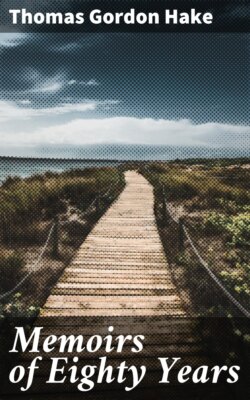Читать книгу Memoirs of Eighty Years - Thomas Gordon Hake - Страница 18
На сайте Литреса книга снята с продажи.
XIII.
ОглавлениеTable of Contents
My mother’s youngest brother was an officer of artillery, and, as adjutant, was always stationed at Woolwich. He had married the daughter of a Mr. Samuel Enderby, an oil-merchant, and a man of great wealth, living on Croom’s Hill, Greenwich, when first I knew his family, and afterwards moving to a mansion on Blackheath.
When a day’s holiday occurred, I and my cousin walked down to my uncle’s house, taking that of the Enderbys on our way. We were paid our travelling expenses both ways, though we never rode, but kept the money in our pockets, together with the heavy tips that we got at both houses.
My uncle did not attain the rank of captain, even, till middle age. Promotion in the artillery, going by rotation, was slow, and so long remained, owing to the Duke of Wellington’s narrow ideas, and brevet at last had to be substituted for real rank.
My uncle, however, died a lieutenant-general, with a good-service pension, followed by the command of a brigade.
My son, Alfred Egmont Hake, has given a true and pleasing account of my uncle, Henry William Gordon, and his family relations, derived from information supplied by me for his “Story of Chinese Gordon,” who was one of my uncle’s younger sons.
I had a strong love for this uncle, and he reciprocated the feeling; nay, more, he always overlooked my faults, which were not a few in the eyes of those relatives who were incompetent to judge me, and expected me to play the commonplace game in life for which, unfortunately, I was wholly unqualified.
Charles Gordon’s education was military only. His rapidity of perception and combination, so conspicuous in his command of an army, were left otherwise barren; he was, therefore, unable to grasp the great truths that surround our actual being, sacrificing their beauty and enjoyment to a meaningless superstition. He had even humour of the most delicate kind, without which no man of genius is ever born, for it is the crowning faculty of man’s intellect.
As possessing a judgment myself which reaches no conclusion before passing through an unprejudiced analysis of all things great and small concerning it, I have never been able to conceive a soldier’s duties accordant with a Christian’s, or to realize such an idea as that of a man leading one army of paid assassins against another, with a love of Christ, or of his Maker, or of mankind in his heart. The fact that men offer their own lives only shows how earnest they are in the profession of shedding blood. Those of the Mahometan class might infuse religion into slaughter; but not one of the disciples or evangelists could have done it, except one.
“Rich must a hero be in superstition
Who deems ’twas God who gave him his commission.”
Throughout his childhood and youth, Charles Gordon associated with soldiers. His family were of the military class; he imbibed the love of their profession. He had an acute mind, with faculties which, if trained, would have served for a philosopher; but he had not the originality that leads a man to educate himself, and to cast all falsehood out of his nature. A slight knowledge of physiology would have sufficed to root out most of his theological ideas; but that slight knowledge, even, he did not possess; and what he most wished might be, he believed. His name is great, but his reputation will rest finally on his military genius and his many virtues.
But to return to my subject. A day’s holiday at Woolwich was a pleasant pastime. It sometimes included a visit to Greenwich Hospital, sometimes a review, and more than once a sight of Richardson’s Theatre at Greenwich Fair-time, when all that is tragical in the world was enacted with all the rant that tradition had handed down from stage to stage.
